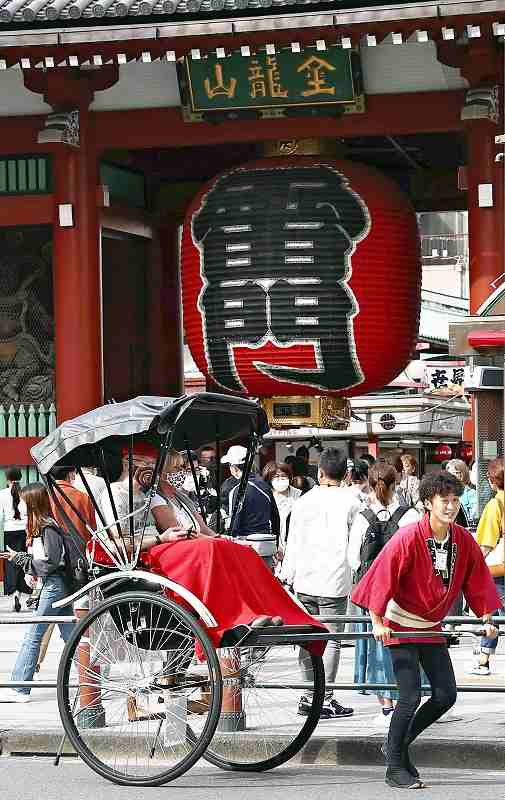Relaxation of Japan’s border control measures brings influx of tourists, but also challenges

Tourists from Germany ride a rickshaw in the Asakusa district of Taito Ward, Tokyo, on Tuesday.
16:01 JST, October 12, 2022
The easing of COVID-19 border control measures on Tuesday has raised hopes for a return to the old bustle of tourist sites across Japan.
Hotels and inns have been inundated with bookings from overseas on the back of the weak yen, but some are struggling to secure staff due to a severe labor shortage resulting from the pandemic. Moreover, infection prevention measures, such as encouraging foreign visitors to wear masks, may also be a challenge.
Rickshaws rolling again
“The city has come alive again,” said a 29-year-old manager and driver at Tokyo Rikisha, a rickshaw tour operator in Asakusa, Tokyo, as he scanned a street where foreign visitors were seen here and there on Tuesday.
Before the pandemic, the company’s rickshaws use to go on as many as 70 or 80 jaunts per day. After the coronavirus outbreak however, its sales were near zero in some months as foreign customers disappeared.
“From now on, I want to increase the number of rickshaw drivers who can speak English,” the rickshaw manager said.
Foreigners living in Japan also welcome the relaxation of border control measures. A 39-year-old German office worker from Edogawa Ward, Tokyo, said he will meet a dozen friends from his old school who will come to Japan. The man, who was visiting Asakusa on Tuesday, said he was looking forward to showing them around tourist spots.
A 62-year-old woman who runs an ukiyo-e print shop on the district’s iconic Nakamise-dori shopping street said, “Since the yen is cheap, we are hoping foreign tourists will buy a lot and help increase our sales even a little, because they’ve fallen to 30% to 40% of what they used to be.”
Manpower shortage
But even as border measures are being relaxed, some accommodations face difficulty finding workers to serve the incoming visitors.
The Niseko area in Hokkaido is popular among overseas skiers for its fine powder snow. But the general manager of a hotel in the area said, “We don’t have enough staff who can speak English.”
As soon as Japan announced the relaxation of border measures in late September, reservations poured in from Australia and other countries. The hotel expects full occupancy for the coming New Year’s holiday season, the first time since the 2019-20 season.
However, the hotel now faces a manpower shortage. It employed as many as 50 to 60 foreign staff at peak times, but that number fell along with the decline in foreign visitors due to the pandemic. The hotel started recruiting staff this month, but the war for talent is so fierce that the general manager said that it was unclear whether the hotel can secure enough foreign workers, and that it barely even had enough Japanese staff.
The Niseko Village ski resort will reopen one of its affiliated hotels from this season after suspending hotel operations due to the pandemic, but a person in charge said it has struggled more than usual with recruiting.
In an August survey by Teikoku Data Bank, Ltd., 72.8% of companies operating inns and hotels said they were short of full-time employees, up 45.5 percentage points from a year earlier. It was the largest shortage rate in any industry.
“Due to the pandemic, hotels and inns are seen as precarious jobs, and it’s not easy to increase the number of employees,” a Teikoku spokesperson said.
Mask messaging
Another anticipated issue is how to encourage foreign visitors to wear masks indoors, such as on public transportation and in accommodations, especially those from some Western countries where it is not customary to wear masks indoors.
Keikyu Corp., which operates train services connecting Haneda Airport with central Tokyo, has posted messages in English and other languages in its stations urging passengers to wear masks, as its trains carry many foreigners immediately after their arrival in Japan.
Alpico Hotels operates several hotels and inns in mountainous tourist area in Nagano Prefecture.
“As the number of foreign visitors increases, some of them will break the rules,” an Alpico spokesperson said. “We want to explain carefully that the measures in Japan could be different from their home countries.”




